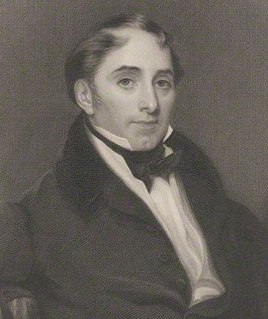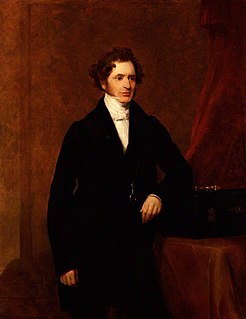Related Research Articles

Sir Robert Peel, 2nd Baronet, was a British Conservative statesman who served twice as Prime Minister of the United Kingdom simultaneously serving as Chancellor of the Exchequer (1834-1835) and twice as Home Secretary. He is regarded as the father of modern British policing, owing to his founding of the Metropolitan Police Service. Peel was one of the founders of the modern Conservative Party.

The Corn Laws were tariffs and other trade restrictions on imported food and corn enforced in the United Kingdom between 1815 and 1846. The word corn in British English denotes all cereal grains, including wheat, oats and barley. They were designed to keep corn prices high to favour domestic producers, and represented British mercantilism. The Corn Laws blocked the import of cheap corn, initially by simply forbidding importation below a set price, and later by imposing steep import duties, making it too expensive to import it from abroad, even when food supplies were short.
The Independent Irish Party (IIP) (1852–1858) was the designation chosen by the 48 Members of the United Kingdom Parliament returned from Ireland with the endorsement of the Tenant Right League in the general election of 1852. The League had secured their promise to offer an independent opposition to the dominant landlord interest, and to advance an agrarian reform programme popularly summarised as the "three F's": fair rent, fixed tenure and free sale.

Isaac Butt was an Irish barrister, editor, politician, Member of Parliament (M.P.) in the House of Commons of the United Kingdom, economist and the founder and first leader of a number of Irish nationalist parties and organisations. He was a leader in the Irish Metropolitan Conservative Society in 1836, the Home Government Association in 1870 and in 1873 the Home Rule League. Colin W. Reid argues that Home Rule was the mechanism Butt proposed to bind Ireland to Great Britain. It would end the ambiguities of the Act of Union of 1800. He portrayed a federalised United Kingdom, which would have weakened Irish exceptionalism within a broader British context. Butt was representative of a constructive national unionism. As an economist, he made significant contributions regarding the potential resource mobilisation and distribution aspects of protection, and analysed deficiencies in the Irish economy such as sparse employment, low productivity, and misallocation of land. He dissented from the established Ricardian theories and favoured some welfare state concepts. As editor he made the Dublin University Magazine a leading Irish journal of politics and literature.

Edward George Geoffrey Smith-Stanley, 14th Earl of Derby, was a British statesman, three-time Prime Minister of the United Kingdom and, to date, the longest-serving leader of the Conservative Party. He was scion of one of Britain's oldest, wealthiest and most powerful families. He is one of only four British prime ministers to have three or more separate periods in office. However, his ministries each lasted less than two years and totalled three years and 280 days. Derby reformed education in Ireland, and reformed Parliament.

The Anti-Corn Law League was a successful political movement in Great Britain aimed at the abolition of the unpopular Corn Laws, which protected landowners’ interests by levying taxes on imported wheat, thus raising the price of bread at a time when factory-owners were trying to cut wages. The League was a middle-class nationwide organisation that held many well-attended rallies on the premise that a crusade was needed to convince parliament to repeal the corn laws. Its long-term goals included the removal of feudal privileges, which it denounced as impeding progress, lowering economic well-being, and restricting freedom. The League played little role in the final act in 1846 when Sir Robert Peel led the successful battle for repeal. However, its experience provided a model that was widely adopted in Britain and other democratic nations to demonstrate the organisation of a political pressure group with the popular base.

John Charles Herries PC, known as J. C. Herries, was a British politician and financier and a frequent member of Tory and Conservative cabinets in the early to mid-19th century.

The 1852 United Kingdom general election was a watershed in the formation of the modern political parties of Britain. Following 1852, the Tory/Conservative party became, more completely, the party of the rural aristocracy, while the Whig/Liberal party became the party of the rising urban bourgeoisie in Britain. The results of the election were extremely close in terms of the numbers of seats won by the two main parties.

Sir James Robert George Graham, 2nd Baronet was a British statesman, who notably served as Home Secretary and First Lord of the Admiralty. He was descended from a family long famous in the history of the English border.
The Peelites were a breakaway dissident political faction of the British Conservative Party from 1846 to 1859. Initially led by Robert Peel, the former Prime Minister and Conservative Party leader in 1846, the Peelites supported free trade whilst the bulk of the Conservative Party remained protectionist. The Peelites later merged with the Whigs and Radicals to form the Liberal Party in 1859.

Lord William George Frederick Cavendish-Scott-Bentinck, better known as Lord George Bentinck, was an English Conservative politician and racehorse owner noted for his role in unseating Sir Robert Peel over the Corn Laws.
The Tenant Right League was a federation of local societies formed in Ireland in the wake of the Great Famine to check the power of landlords and advance the rights of tenant farmers. An initiative of northern unionists and southern nationalists, it articulated a common programme of agrarian reform. In the wake of the League's success in helping return 48 pledged MPs to the Westminster Parliament in 1852, the promised unity of "North and South" dissolved. An attempt was made to revive the all-Ireland effort in 1874, but struggle for rights to the land was to continue through to the end of the century on lines that reflected the regional and sectarian division over Ireland's continued place in the United Kingdom.

William Sharman Crawford (1780–1861) was an Irish landowner who, in the Parliament of the United Kingdom, championed a democratic franchise, a devolved legislature for Ireland, and the interests of the Irish tenant farmer. As a Radical representing first, with Daniel O'Connell's endorsement, Dundalk (1835-1837) and then, with the support of Chartists, the English constituency of Rochdale (1841–1852) he introduced bills to codify and extend in Ireland the Ulster tenant right. In his last electoral contest, standing on the platform of the all-Ireland Tenant Right League in 1852 he failed to unseat the Conservative and Orange party in Down, his native county.
Events from the year 1879 in Ireland.
Sir William Miles, 1st Baronet, was an English politician, agriculturalist and landowner. He was educated at Eton College and Christ Church, Oxford, and was created a baronet on 19 April 1859, of Leigh Court, Somerset.

Francis Nicholas Blundell was a British landowner and Conservative politician.

Clare Sewell Read was a British agriculturist and Conservative politician.
Sir John Stuart was a British Conservative Party politician who sat in the House of Commons from 1846 to 1852, before becoming a judge.
Samuel MacCurdy Greer (1810–1880), was an Irish politician who, in Ulster championed Presbyterian representation and tenant rights. He was a founder member of the Ulster Tenant Right Association and of the all-Ireland Tenant Right League. In the general election of 1857 he was returned to Westminster on a tenant-right platform for County Londonderry.
References
- Travis L. Crosby, English Farmers and the Politics of Protection. 1815-1852 (The Harvester Press, 1977).
- Robert Stewart, The Politics of Protection. Lord Derby and the Protectionist Party. 1841-1852 (Cambridge University Press, 1971).